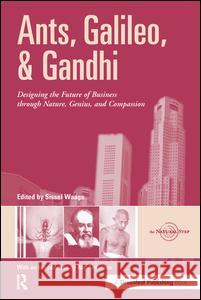Ants, Galileo, and Gandhi: Designing the Future of Business Through Nature, Genius, and Compassion » książka
Ants, Galileo, and Gandhi: Designing the Future of Business Through Nature, Genius, and Compassion
ISBN-13: 9781874719762 / Angielski / Twarda / 2003 / 272 str.
Ants, Galileo, and Gandhi: Designing the Future of Business Through Nature, Genius, and Compassion
ISBN-13: 9781874719762 / Angielski / Twarda / 2003 / 272 str.
(netto: 506,83 VAT: 5%)
Najniższa cena z 30 dni: 503,69
ok. 22 dni roboczych
Bez gwarancji dostawy przed świętami
Darmowa dostawa!
Although sustainability efforts in business are still a work in progress, it is increasingly clear that key elements of a new generation of enterprises will be radically different from those of our contemporary modern industrial economy. The core distinctions between what currently exists and what is being created are communicated in this book through the compelling metaphor of Ants, Galileo, and Gandhi.
This collection, developed from The Natural Step's conference on Sustainability and Innovation in 2002, provides radical ideas for generating a new perspective on the dynamics of business systems. 'Ants' symbolize the lessons to be learned from nature and the dependence of individual beings on broader, complex systems. -Galileo- embodies brilliance in perceiving and proving that the current paradigm is flawed. -Gandhi- exemplifies exceptional compassion in fighting for fundamental change.
All of these attributes are increasingly relevant in a world where, globally, we are experiencing both a steady decline in life-supporting resources and rising demands. Recognition of these challenges is sparking innovation within the private sector where the first glimmers of systemic change can be seen. The book examines the emergence of 21st-century enterprises that recognize their reliance on broad social and ecological systems (-ants-), incorporate sparks of genius rooted in rigorous analyses ('Galileo'), and acknowledge the importance of compassion and determination within any endeavour ('Gandhi').
With contributions from Ray Anderson, Gretchen Daily, Karl-Henrik Robert, Alois Flatz, Allen White and many more, the book illustrates that pioneering companies recognize that new opportunities emerge from recognizing the broader systems on which all businesses rely. Efforts to work with ecological and social dynamics of vibrancy and resilience offer a new space for innovation. Companies are stepping into this space and exploring innovative approaches to developing sustainability-focused products, operations and strategies. These sustainability-inspired business efforts are considering new ways to address human needs and desires. The most promising approaches are based on systems thinking and recognition of the linkages between 'upstream' and 'downstream' effects of actions. Understanding the undesired 'downstream' impacts of a firm's practices draws attention 'upstream'. This assessment highlights the most expedient approach: to design these impacts out of enterprises from the very start.
The book is divided into five sections to present a set of theories emerging about sustainability and its application to: business strategy and operations; financial-sector practices; accountability and reporting drivers; and organizational change pathways. Together, these sections illustrate the current range of sustainability theories and applications.
Ants, Galileo, and Gandhi will be essential reading for both academics looking for robust teaching material, practitioners looking for inspiration and the general reader interested in exploring the state of the art in the realignment of 21st-century business.











